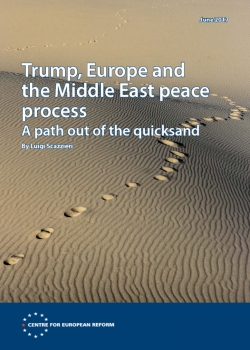
Trump, Europe and the Middle East peace process: A path out of the quicksand
- The prospects for a two-state solution to the Israel-Palestine conflict are receding, as Israel tightens its control over the West Bank. After the failure of US-sponsored talks in 2014, progress does not seem likely: neither side is particularly interested in negotiations and both are tightly constrained by domestic politics.
- US President Donald Trump has said that he wants to strike the “ultimate deal” and appears genuinely committed to push for peace. But Trump has been ambiguous about his commitment to the two-state solution.
- Even if the Trump administration engages constructively in negotiations, the chances of progress are slim, given the difficulty of getting the two sides to talk, and the reluctance of external actors to put pressure on Israel and the Palestinian Authority (PA). Progress through multilateral initiatives will also be very difficult, as the Trump administration is likely to block any UN resolution that seeks to hold Israel accountable for its actions.
- This stalemate has led some observers to push for a settlement other than the two-state solution. But other possible models, such as a one-state solution, are equally, if not even more unrealistic.
- Any final settlement of the conflict remains far off. In these circumstances, it would be more productive if international diplomacy focused on intermediate steps to bring the parties gradually closer, without prejudicing the shape of a final agreement.
#Middleeastpeaceprocess EU & US should aim for incremental progress to improve situation on the ground
- Europe and the US should aim for incremental progress to improve the situation on the ground. They should end Israeli settlement construction and improve material conditions in the West Bank. They should pressure Israel to enact a phased release of land for Palestinian economic development in return for a halt to the PA’s financial support to terrorists and their families.
- The point of these steps would be to improve relations; rebuild confidence that a solution to the conflict can be achieved; and preserve the viability of the two-state solution.
- Both Israel’s government and the PA have reasons to reduce the risks they face: many members of the Israeli security establishment are willing to countenance steps that enhance Israel’s security, as an end to settlement expansion would, and large parts of Israeli society appreciate that expansion will eventually lead to international isolation. On the Palestinian side, the PA knows it is losing legitimacy amongst Palestinians, and wants to reinforce its position.
- Europe should adopt a balanced approach. To increase pressure on Israel to strike a deal, it should increase existing ‘differentiation’ measures, distinguishing its economic relations with Israel from those with the occupied territories. At the same time, it should show greater appreciation of Israeli security concerns and promise deeper economic relations if a deal is struck.
#EU27 can play key role in fostering Palestinian ec development & help implement any agreement w Israel
- If Israel takes positive steps towards peace, Europe should press the PA to reciprocate. In the medium term, the EU and its member-states can play a key role in fostering Palestinian economic development and smooth the path to implementing any agreement the two sides reach.
Luigi Scazzieri is a research fellow at the Centre for European Reform.
Copyright is held by the Centre for European Reform. You may not copy, reproduce, republish or circulate in any way the content from this publication except for your own personal and non-commercial use. Any other use requires the prior written permission of the Centre for European Reform.

